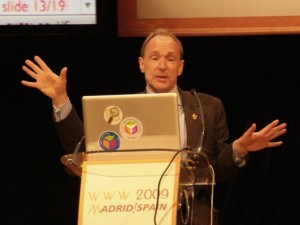Learn more
- Apr 22, 2009
Tim Berners-Lee: “We need data on the Web to work better together”
Today, the 18th WWW conference started in Madrid, Spain. In his opening talk, Tim Berners-Lee outlined the status quo of the current Web and focused on areas for ongoing research.
According to Tim Berners-Lee the Web is still static and consists mostly of archived HTML and PDF documents. There is still a need for a read/write Web and the standards are still not used to a sufficient extend. Changes in the Web are the ‘move to mobile’ and the climb up of ‘advertizing to being a science’.
Beside the still existing challenges of the current Web, additional ones arrived. Web Applications as well as Open Social Networking and Open Linked Data count to the area of current interest.
Web Applications are supposed to become new computing platforms and need a serious clean trust system. In the future Web Applications could offer a decentralized modular installation like a webized Debian.
Open Social Networking has become a great application in the Web. Currently it suffers from the ‘Social Silo Problem’. Users have often accounts in several platforms like Facebook or MySpace. The platforms, however, are separated from each other like in a field of silos. The challenge of the Semantic Web Community is now to interconnect the silos via RDF, OWL, HTTP, and SPARQL. A further requirement of Tim Berners-Lee are to focus on a Secure Web id.
Open Linked Data attracted the attention of Tim Berners-Lee most of all. Being one of the chairs of the co-located workshop ‘Linked Data on the Web’ he stressed that “we need data on the Web to work better together” in government, enterprise, and science. Open Linked Data could be a wizard for users of existing relational database systems. As query language he proposed a federated/delegated SPARQL.
Finally, Tim Berners-Lee described the role of researchers in those challenges. Researchers should ‘build a platform for others that follow’. Thereby, one should not assume what people will use the platform for.
(Report by Christoph Wieser / Salzburg Research)
